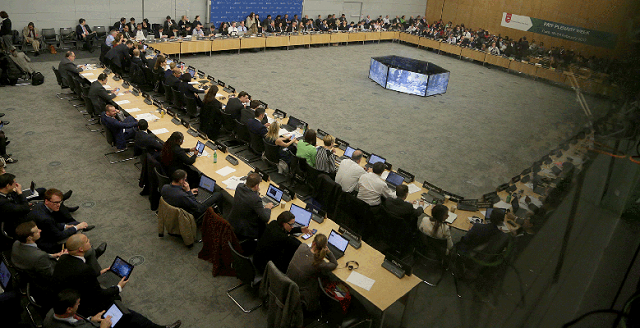Early exit from FATF grey list unlikely
Islamabad still not complying with 70% of recommendations

A meeting of the FATF. PHOTO:FATF
The staggering non-compliance figure, which makes up 70% of the total recommendations, suggests that the authorities have to double their efforts to exit the grey list in the next one year.
A report by the Asia Pacific Group (APG) –an FATF styled regional body – has provisionally assessed Pakistan aimed at highlighting the loopholes that have to be plugged in to avoid being blacklisted.
The FATF has developed 40 recommendations to curb money laundering and terrorism financing in the world and every jurisdiction is assessed based on these global standards.
Pakistan enacts ambitious reforms to comply with FATF
Pakistan’s legal and regulatory regime has to be drastically amended in next few months, which seems an uphill task given the political polarisation in the country.
The sources said the APG declared Pakistan compliant only on two counts and was largely satisfied on six other recommendations. The FATF put Pakistan on the grey list with effect from June this year after finding deficiencies in the country’s anti money laundering and counter terrorism financing regimes.
The FATF and the APG have already handed over 26-point Action Plan to Pakistan to come out of the grey list by September next year. The APG technical experts also visited Pakistan from October 8 to 19 as part on on-site Mutual Evaluation of Pakistan.
The sources said the APG is urging Pakistan to introduce new regulations for lawyers, requiring them to inform the Financial Monitoring Unit about suspicious transactions.
The foreign experts also showed concerns over lax business regimes of gems and precious stones, warning that these could be used for money laundering.
Non-compliance areas
The APG has provisionally rated Pakistan non-compliant with five recommendations that are related to non-profit organisations, designated non-profit business or professions (DNFBPs) customers due diligence, regulations and supervision of DNFBPs, mutual legal assistance, freezing and confiscation and others forms of institutional cooperation. The APG has declared real estate dealers, dealers in precious metals & stones, lawyers and notaries as medium to high risk areas.
Partially compliant
The sources said the APG has assessed Pakistan’s performance on nearly two-dozen recommendations as partially compliant. They said that these are areas where the country has to make real efforts to come out of the grey list in next one year.
The country was partially compliant on the recommendation of assessing risks and applying a risk-based approach. The banking, securities market, insurance sector and asset management have been provisionally declared as medium-risk areas.
The central directorate of national savings has been described as medium to low risk area. The Pakistan Post, non-bank financial institutions, modarbas and development financial institutions, accountants and financial inclusion are categorised as low risk areas.
Pakistan is also partially compliant with recommendation of national cooperation and coordination –a rating that remains unchanged for last nine years. The key reason for declaring Pakistan partially compliant is that the AML polices were not fully implemented.
All the stakeholders were not fully supporting these policies, according to the APG’s views.
The country was also partially complying with the criterion of targeted financial sanctions related to terrorism and terrorist financing. Pakistan did not extend the freezing regulations on all types of assets of these organisations.
The country has also been rated partially complying with the requirement of customer due diligence because of lack of enhanced due diligence of high-risk customers. The FATF recommendations regarding money transfer, new technologies and wire services are also partially complied with.
The APG noted that there was a narrow scope of preventive measures against exchange companies. The financial institutions also lacked the criterion to assess new technology risks. Similarly, the exchange companies did not have advanced mechanisms to verify the identity of originators of the wire transfers and there was no obligation on the banks to obtain originator information.
The country is also partially complying with recommendation of internal controls and foreign banks and their subsidiaries. The reason to declare Pakistan’s performance below par on this count is that there was no requirement for the NBFCs to establish training programmes and implement screening requirements for the employees.
Pakistan is also provisionally rated partially complying with the recommendation of dealing with high risk countries. The APG’s provisional findings were that Pakistan is not able to apply counter measures to financial institutions and reporting entities being originated from high-risk countries like North Korea and Iran.
Similarly, on the recommendation of reporting suspicious transactions Pakistan is declared partially compliant. The APG recommended Pakistan to make it binding to promptly report the suspicious transactions instead of reporting it within seven days.
The country is not meeting all the requirements of transparency and beneficial ownership of legal persons and legal arrangements. The APG’s findings were that Pakistan’s laws and regulations did not require adequate transparency concerning the beneficial ownerships.
NACTA says it is unable to prepare crucial report for FATF
The country has not assessed the money laundering and terrorism financing risks associated with all types of legal persons. The companies also do not promptly disclose the shareholders information.
The APG’s observations were that the law enforcement and investigative authorities were handicapped, as the anti-money laundering law does not give them investigation powers when a predicate offence is committed.
Pakistan was also partially complying with recommendation about powers of law enforcement and investigative authorities. One of the objections was that the authorities did not have the powers to request all types of information from the Financial Monitoring Unit. Also, the penalties on violations were inadequate.
The APG also had serious issues regarding Pakistan’s deficient mutual legal assistance regime. The FATF recommendation on extradition is also partially compliant due to deficiencies in the legal framework.



















COMMENTS
Comments are moderated and generally will be posted if they are on-topic and not abusive.
For more information, please see our Comments FAQ